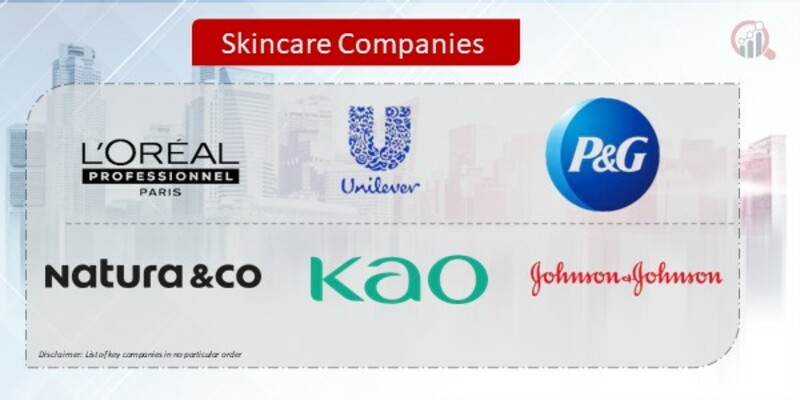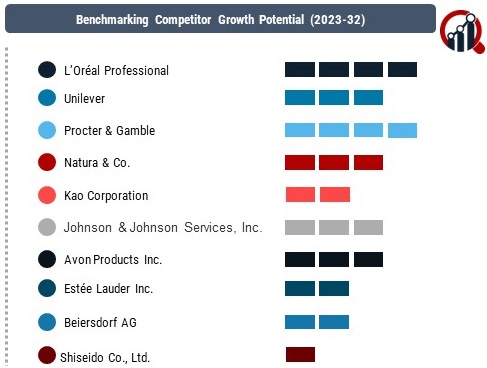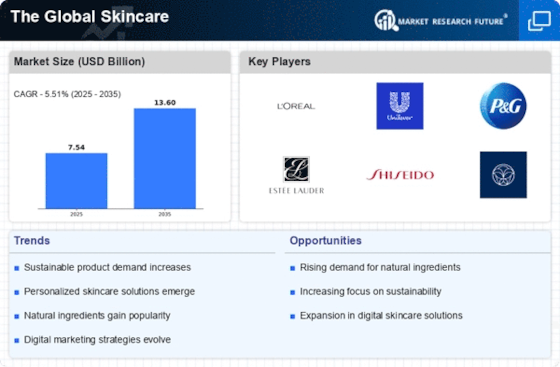Top Industry Leaders in the Skincare Market

As the skincare market continues to evolve, new and emerging companies are entering the arena, introducing novel concepts and addressing niche consumer needs. Start-ups like The Ordinary and Glossier have gained prominence by focusing on simplicity, transparency, and direct-to-consumer models. These companies often leverage social media platforms and influencer marketing to build brand awareness and connect directly with consumers. The industry is witnessing a rise in demand for personalized skincare solutions, prompting new entrants to offer customization options and innovative product formulations to cater to individual preferences.
Industry news within the skincare market reflects ongoing trends, technological advancements, and shifts in consumer behavior. News related to collaborations with dermatologists, influencers, and beauty experts showcases efforts to enhance brand credibility and product efficacy. Moreover, developments in sustainable packaging, cruelty-free formulations, and the use of cutting-edge ingredients are frequently covered in industry news, aligning with the growing emphasis on ethical and environmentally conscious beauty practices. The market also responds to global events and societal changes, with news covering topics such as the impact of the COVID-19 pandemic on skincare routines and the increasing focus on wellness-driven skincare.
Current investment trends in the skincare industry underscore a dual focus on research and development of innovative formulations and sustainability initiatives. Key players are directing investments towards scientific research, exploring the benefits of advanced ingredients, and incorporating technology for product development. Investments in eco-friendly packaging, cruelty-free practices, and ethical sourcing of raw materials are prevalent, reflecting a commitment to addressing environmental and social responsibilities. Additionally, strategic investments in digital marketing, e-commerce capabilities, and direct-to-consumer channels are notable trends as companies aim to strengthen their online presence and engage directly with a tech-savvy consumer base.
The overall competitive scenario in the skincare market is characterized by established brands and innovative newcomers, each navigating the industry with distinct strategies. Market share analysis considers factors such as brand reputation, product efficacy, and responsiveness to evolving beauty trends. The industry's responsiveness to sustainability, customization, and the integration of technology further shapes competitiveness. As consumers increasingly seek skincare solutions aligned with clean and conscious beauty practices, the skincare market is poised for continued evolution, with companies striving to balance efficacy, innovation, and ethical considerations.
In conclusion, the skincare market's competitiveness is driven by a mix of established players and innovative newcomers. Key players strategically position themselves through brand recognition, innovation, and sustainability efforts. New entrants leverage simplicity, transparency, and customization to carve out their niche. Industry news reflects the dynamic nature of the market, responding to trends, technological advancements, and shifts in consumer behavior. Current investment trends emphasize research and development, sustainability, and a digital-first approach. The overall competitive scenario underscores the importance of adaptability, innovation, and a nuanced understanding of the multifaceted factors influencing the skincare market.
Industry News and Investment Trends:
- Recent deals, like Unilever's acquisition of Tula and L'Oreal's investment in Verily Life Sciences, demonstrate the market's tendencies toward diversification and consolidation.
- A focus on future innovation is shown by increased spending in research and development, especially in the areas of biotechnology, customized medicine, and sophisticated delivery methods.
- The emergence of social commerce platforms such as Instagram and TikTok is impacting consumer buying behavior and opening up new avenues for brand promotion.
Key Companies in the Skincare Market Include –
- L’Oréal Professional
- Unilever
- Procter & Gamble
- Natura & Co.
- Kao Corporation
- Johnson & Johnson Services, Inc.
- Avon Products Inc.
- Estée Lauder Inc.
- Beiersdorf AG
- Shiseido Co., Ltd.
- Coty Inc.











